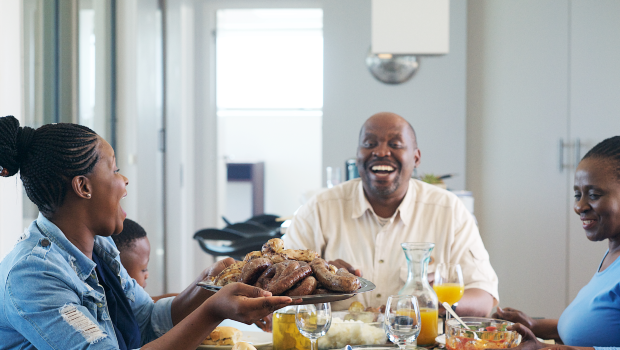
They’d been happily married for 15 years when she received the shock of her life. Over breakfast her husband told her something that would make any woman choke on her toast: he wanted to take a second wife.
For Lillian Makhubalo* it was like a blow to the heart. The 58-year-old and her husband, Thamsanqa*, 65, married when Lillian was 18. She’d dropped out of school to help her sick grandmother, Nomqondiso, when Thamsanqa asked her for her hand in marriage. He was a handsome 25-year-old who worked as a miner, and when he asked her gogo if he could marry Lillian, Nomqondiso agreed.
The newlyweds moved to Soweto where they started a family after Nomqondiso died. Lillian had twins Zakhele* and Zanele* (now 39), and thought she and her husband were happy. But then came Thamsanqa’s shattering statement. Thamsanqa clears his throat and holds his wife’s hand as he tells us that after being married for 15 years, he knew he needed a second wife.
READ MORE: Is non-monogamy for you?
“My wife and I were happy – there was absolutely nothing wrong with our marriage. I grew up as an only child, and I always knew I wanted a lot of children, but my wife’s pregnancy with the twins was very complicated. She almost lost her life – I couldn’t bear the thought of losing her.” He kisses the back of Lillian’s hand as he talks. One Sunday morning Thamsanqa sat her down and asked her how she’d feel if he took a second wife.
“Naturally, I instantly felt like I wasn’t woman enough for him,” Lillian says. “I was so sad and heartbroken to the point of not speaking to him for three days!” After calming down Lillian communicated her feelings and concerns to Thamsanqa, and he explained his point of view.
“After those three days I regretted everything and I blamed myself for her heartache,” he says. “I told her that if it was going to make her unhappy I would forget about the whole idea. “But surprisingly enough, she understood and agreed to it. Maybe it was because I didn’t have anyone in mind when I approached her – I wasn’t cheating on my wife, I’d never do that.”
In many societies the concept of polygamy is frowned upon because it goes against the Western idea of loving, honouring and obeying one person until death do you part. Yet there are many other cultures that support a man’s choice to take more than one wife and believe it is something that can benefit the women as well.
READ MORE: Surviving a polygamous marriage
Lillian, for example, says she changed her mind because she could see how sorry Thamsanqa was for hurting her, and when he explained his reasons she was able to move from heartbreak to acceptance. “Don’t be too quick to bash him,” Lillian advises other women in her position.
“Understand that he could’ve cheated, but rather chose something that is common in African culture.” Thamsanqa says it’s important to make sure you really want another wife, and to thoroughly analyse your reasons.
“Then communicate every detail to your wife – she deserves that. And reassure her of your love.” They found his second wife together – a woman who was a regular on one of his taxi routes. He’d moved from mining to owning a taxi business. “He loved her, and I was fond of her,” Lillian says.
“She’s a nurse, not one of those rude ones, and she was kind and very helpful. When he proposed to her she first came to me to check if he had my blessing. I was so impressed.”
READ MORE: Celeste Ntuli and Ayanda Borotho on their roles as sister-wives in Isibaya
After the wedding they all moved into a bigger house with cottages at the back for the children. “Normally the husband stays in the main house and then the wives have their own homes outside,” Lillian explains.
“But Thembi* (the second wife) shocked our husband and decided to stay in the main house with Thamsanqa.” They each have their separate rooms, and their husband alternates time spent between them equally. Lillian takes care of the children and is responsible for the admin of the taxi business, and Thembi still works as a nurse.
“Initially, uBaba wanted me to stop working and look after the business as well but my calling is nursing,” says a shy Thembi, 52, as she finally joins the conversation.
“Ja, I like these young ones,” Lillian interrupts and they all laugh. “They know what they want and work hard – they don’t just take the man’s words as the Bible.”
“Growing up my mother was abused by my father,” Thembi says as she wipes away a tear. “He killed her when I was nine years old and he was arrested. A nurse brought me this far – she took me into her arms and her home and decided she would be my mother.
“So finding a man who respects women like uBaba is a blessing,” The two women share the home duties between them, taking turns cooking and cleaning, and their six children help with the dishes and other household duties.
“I know in some families the children of the first wife have some sort of higher status, but this is my home and I don’t want to raise my children like that,” Thamsanqa says. “They’re all equal and these two women are their mothers equally.
They adhere to the rules that all three of us set for them, like normal children.” Zakhele walks in with his youngest brother, Thembekile*, 2, in his arms. He says he isn’t much of a speaker.
“I’m in computer programming, which should tell you how much I love interacting with people,” he says with a laugh. “I was 14 when mom and dad told us Mam’ Thembi would be our second mother.
I didn’t really get it, but my parents are big on communication – in a week’s time I was on board.” Thembi says she knows people often question polygamous marriages but she’s adamant that sometimes the women gain a lot more than the men.
“By marrying uBaba I’ve not only gained an amazing husband and beautiful children – I’ve also gained a sister I wouldn’t otherwise have had. And more children too – they are all so respectful and loving, a clear example of the home they’re being brought up in.”
READ MORE: How to end sibling rivalry
But that’s not how it works out for everyone. Evelyn*, 32, tells DRUM her mother’s experience was awful.
“Eva*, now 60 was married to my father for 28 years, and then one day he said he would like to add two more wives – they were twins,” she recalls. Eva wasn’t happy, but her husband went ahead and traditionally married the two women without her consent.
His actions went against the traditional practice of asking for her permission and mediating until a solution is found, but legally he was within his rights. “It was hell for my mom and me afterwards,” Evelyn says.
“The two new wives bullied my mother and called her names. They were much younger than my mother, just eight years older than me.
I defended my mother and my dad just watched everything unfold.” After three years of this, Eva decided to file for divorce but her husband, Evelyn says, “is still trying to milk her for all her money”. “My mother is a retired teacher and my dad could never keep a job, so she supported us. After my brother died in a car accident my father started acting strange. “What kind of man has three wives and no job?
That’s irresponsible.” Evelyn, who has a four-year-old son, now works as a waitress to help her mother with the legal fees for her divorce. “I’m raising my son to be a responsible man who will not look down on women, like my father does,” she says.
“You know, it’s so sad because the new wives are also being treated horribly by my father but they’re too proud to talk to my mother because of the way they mistreated her.”
Evelyn shrugs and says women should always know their rights and not be afraid to fight for them. Changes to the law have meant that women in customary marriages now have more protection than before.
READ MORE: Customary law – know your rights
DAY-TO-DAY MATTERS
In a home with more than one wife, what happens when problems arise? “If the wives have any conflict they first need to try to resolve it among themselves,” says historian and cultural expert Professor Jabulani Maphalala.
“If that doesn’t work then they go to the husband and present their cases, and the husband’s role is to restore peace.” Children can complicate matters further as each mother might feel the maternal pull to protect her own offspring more than the children of the other wives.
And it can get particularly difficult when it comes to discipline. But Professor Maphalala says although each family has its own way of doing things, it’s usually the husband who decides how the children should be disciplined. And what if one of the wives has a problem with the way her husband is treating her?
“She should approach him first and address the issue,” Maphalala suggests. “If that doesn’t help, she can then approach his elders and explain exactly what it is that’s happening and how she’d like them to help.
“In most cases the husband will go back to the wife and apologise after his elders have spoken to him.” In the normal course of events there’s no need for formal structures in polygamous relationships as the wives usually work most things out for themselves, he says.
Finding the right path for their family also provides an opportunity for bonding. “Remember, in a normal setup the wives are not enemies nor are they in competition,” Maphalala points out. “They are sister wives, which means they have a friendship as well.
“They get along because this is normal to them – they have agreed to it.”
*Not their real names


















